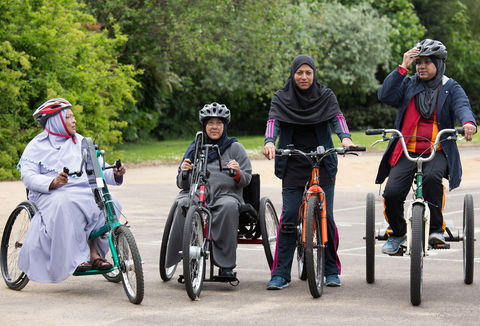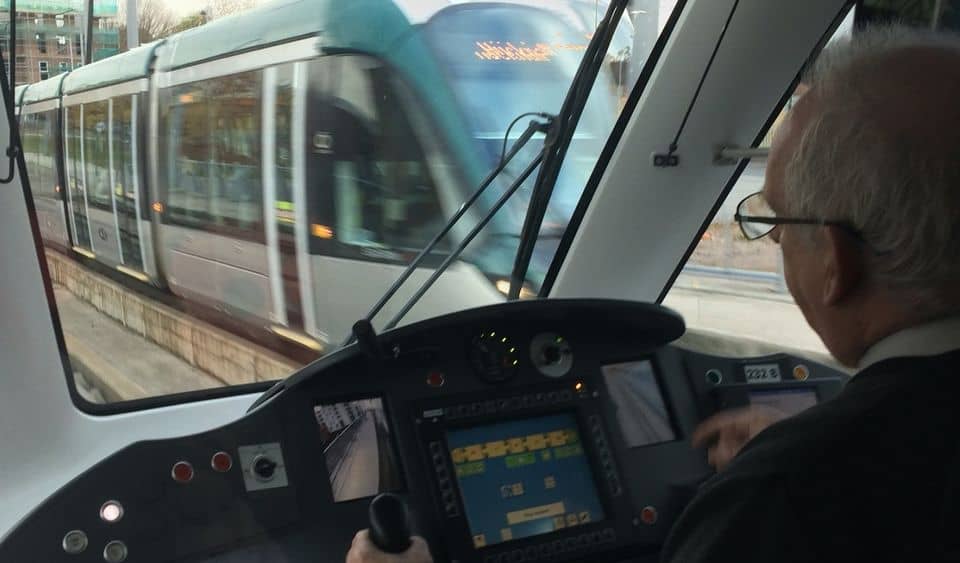On Wednesday 7 November Ashden headed to the Midlands, bringing together representatives from local and combined authorities around England to visit, experience and learn about three Ashden Award winning approaches to sustainable transport. We were hosted by 2017 Ashden Award winner, Nottingham City Council and also heard from Liftshare and the Active Well-being Society (formerly Big Birmingham Bikes).
Attendees included councillors, transport planners and those with an economic growth remit, highlighting the breadth of interest in sustainable transport solutions. The visiting authorities all face congestion and air quality challenges, with some already considering a Workplace Parking Levy (WPL). The day was a great success in connecting those who want to better understand the political and logistical barriers involved with those who have already overcome them, or have different approaches to suggest.
Cleaner, greener public transport in Nottingham
Nottingham City Council won an Ashden Award for their implementation of a Workplace Parking Levy – businesses within the city centre that have more than ten car parking spaces are charged an annual fee which they can choose to absorb or pass on to employees. The £44 million raised from this scheme since 2012 has enabled a step change in transport infrastructure in Nottingham, more than doubling the size of the city’s tram network through a £570m extension, helping to fund a £60m redevelopment of the city’s railway station and support for the £15m award-winning fully electric Link bus network. Revenue from the scheme is ring-fenced for public transport improvements, and has been central to leveraging in additional funding.

Eurostar Ashden Award for Sustainable Travel
liftshare
Read more
Attendees came to hear how Workplace Parking Levy could work in their cities and riding the clean electric buses and the tram extension enabled by the levy brought its potential to life. Hearing from other Ashden Award winners Liftshare, who enable car sharing, and The Active Well-being Society (formerly Big Birmingham Bikes), who provide bikes to socially excluded groups, as well as a tour of Chargemaster’s electric vehicle charging points, helped make the case that an integrated sustainable transport system isn’t just a solution to congestion and air pollution. Social, environmental and economic issues like isolation and loneliness, health and well-being, and financial savings for business and individuals can all be tackled whilst working towards a climate friendly solution to transport.
The main takeaways of the day were that the WPL delivers – although there was business opposition initially, the support from local government and conviction that their congestion urgently needed to be dealt with ensured they remained committed to the scheme. Businesses now simply see it as business as usual. More people are using public transport and congestion has been constrained, even as Nottingham’s economy has grown.
But will it help with air quality?
In a changed policy context, a WPL has even more potential – when Nottingham developed the WPL their main driver was tackling congestion. Now, with recent reports from WWF and World Health Organisation including stats like 90% of children around the world breathing in toxic air, the issue of air quality is everything. It’s preoccupying political leaders of all parties, many of whom have never had environmental issues high up their priority list. With the potential to raise money for badly needed public transport improvements and to better integrate a city’s offer, a WPL can support a shift out of cars and into the more active, cleaner modes of travel that are essential to improving air quality.

Joint winner of the 2017 UK Ashden Award for Clean Air in Towns and Cities
The Active Well-Being Society (formerly Big Birmingham Bikes)
Read more
Many cities are now required to develop clean air zones with stringent approaches to tackling emissions, and rightly so. With the improvements and investments in sustainable transport that Nottingham’s WPL has enabled, Nottingham have avoided the requirement to put a clean air zone in place. Not all local authorities will be able to benefit in this way, as Nottingham has had a long lead in time, but the fact that the improvements it enabled have meaningfully tackled air quality is a powerful recommendation for it.
Nottingham has done the heavy lifting – it’s uncovered and dealt with bumps along the road and is keen to share its learning. They feel that, with their learning on board, local authorities looking to implement a WPL could do so within a single electoral cycle, removing the risk of political change.
We would like to thank Nottingham City Council again for hosting us and being so generous in their willingness to share their WPL expertise. Thank you to everyone who came and to Liftshare and The Active Well-being Society for such informative and impactful presentations. If you would like to learn more you can read about our liveable cities programme here or please get in touch with Faye.Scott@ashden.org.
Keep up to date with similar upcoming Ashden events here and on Twitter.

